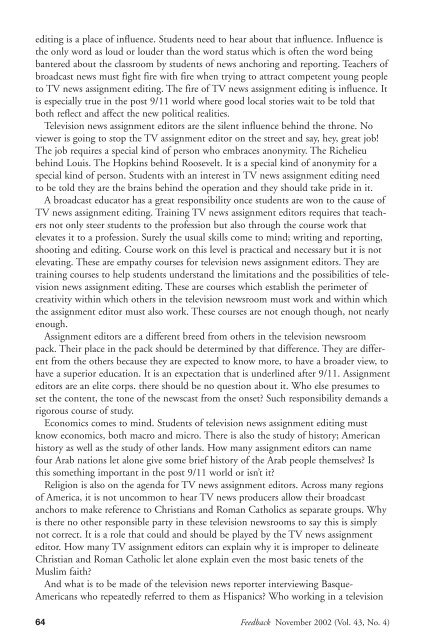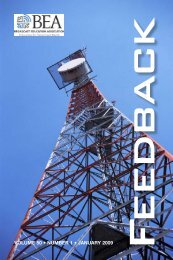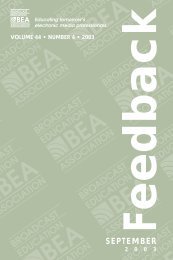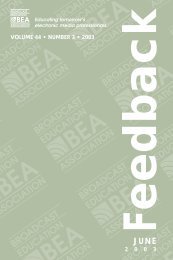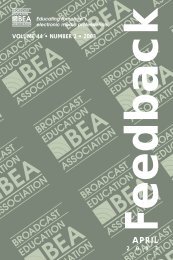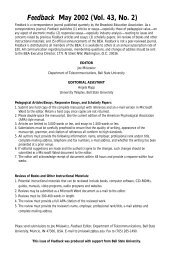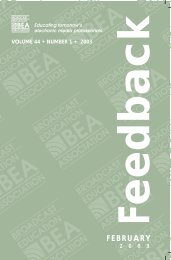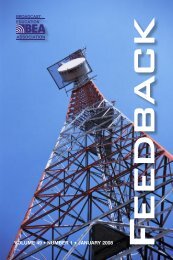Feedback November 2002 (Vol 43 No 4)
Feedback November 2002 (Vol. 43, No. 4) - Broadcast Education ...
Feedback November 2002 (Vol. 43, No. 4) - Broadcast Education ...
You also want an ePaper? Increase the reach of your titles
YUMPU automatically turns print PDFs into web optimized ePapers that Google loves.
editing is a place of influence. Students need to hear about that influence. Influence isthe only word as loud or louder than the word status which is often the word beingbantered about the classroom by students of news anchoring and reporting. Teachers ofbroadcast news must fight fire with fire when trying to attract competent young peopleto TV news assignment editing. The fire of TV news assignment editing is influence. Itis especially true in the post 9/11 world where good local stories wait to be told thatboth reflect and affect the new political realities.Television news assignment editors are the silent influence behind the throne. <strong>No</strong>viewer is going to stop the TV assignment editor on the street and say, hey, great job!The job requires a special kind of person who embraces anonymity. The Richelieubehind Louis. The Hopkins behind Roosevelt. It is a special kind of anonymity for aspecial kind of person. Students with an interest in TV news assignment editing needto be told they are the brains behind the operation and they should take pride in it.A broadcast educator has a great responsibility once students are won to the cause ofTV news assignment editing. Training TV news assignment editors requires that teachersnot only steer students to the profession but also through the course work thatelevates it to a profession. Surely the usual skills come to mind; writing and reporting,shooting and editing. Course work on this level is practical and necessary but it is notelevating. These are empathy courses for television news assignment editors. They aretraining courses to help students understand the limitations and the possibilities of televisionnews assignment editing. These are courses which establish the perimeter ofcreativity within which others in the television newsroom must work and within whichthe assignment editor must also work. These courses are not enough though, not nearlyenough.Assignment editors are a different breed from others in the television newsroompack. Their place in the pack should be determined by that difference. They are differentfrom the others because they are expected to know more, to have a broader view, tohave a superior education. It is an expectation that is underlined after 9/11. Assignmenteditors are an elite corps. there should be no question about it. Who else presumes toset the content, the tone of the newscast from the onset? Such responsibility demands arigorous course of study.Economics comes to mind. Students of television news assignment editing mustknow economics, both macro and micro. There is also the study of history; Americanhistory as well as the study of other lands. How many assignment editors can namefour Arab nations let alone give some brief history of the Arab people themselves? Isthis something important in the post 9/11 world or isn’t it?Religion is also on the agenda for TV news assignment editors. Across many regionsof America, it is not uncommon to hear TV news producers allow their broadcastanchors to make reference to Christians and Roman Catholics as separate groups. Whyis there no other responsible party in these television newsrooms to say this is simplynot correct. It is a role that could and should be played by the TV news assignmenteditor. How many TV assignment editors can explain why it is improper to delineateChristian and Roman Catholic let alone explain even the most basic tenets of theMuslim faith?And what is to be made of the television news reporter interviewing Basque-Americans who repeatedly referred to them as Hispanics? Who working in a television64<strong>Feedback</strong> <strong><strong>No</strong>vember</strong> <strong>2002</strong> (<strong>Vol</strong>. <strong>43</strong>, <strong>No</strong>. 4)


